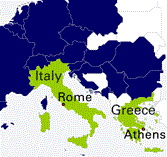- BY Free Movement

Removals to Greece suspended
THANKS FOR READING
Older content is locked

A great deal of time and effort goes into producing the information on Free Movement, become a member of Free Movement to get unlimited access to all articles, and much, much more
TAKE FREE MOVEMENT FURTHER
By becoming a member of Free Movement, you not only support the hard-work that goes into maintaining the website, but get access to premium features;
- Single login for personal use
- FREE downloads of Free Movement ebooks
- Access to all Free Movement blog content
- Access to all our online training materials
- Access to our busy forums
- Downloadable CPD certificates
 The Government has confirmed that removals to Greece under the Dublin II Regulation have been suspended pending the outcome of the test case. This comes following a number of recent news items on the calamity that is the Greek asylum ‘system’. Or, in the words of UNHCR themselves, ‘humanitarian crisis’. This extract from a recent Human Rights Watch report gives a flavour of the problem:
The Government has confirmed that removals to Greece under the Dublin II Regulation have been suspended pending the outcome of the test case. This comes following a number of recent news items on the calamity that is the Greek asylum ‘system’. Or, in the words of UNHCR themselves, ‘humanitarian crisis’. This extract from a recent Human Rights Watch report gives a flavour of the problem:
The country has one of the lowest rates of granting refugee status for asylum seekers in Europe. In 2009, it granted refugee status to a mere 0.04 percent of applicants at first instance – 11 people out of almost 30,000 applicants. It also abolished the appeals mechanism in July 2009, leaving rejected asylum seekers with no way to challenge a negative decision, and leading UNHCR to suspend its formal role in the asylum procedure.
Filing an asylum application is very difficult, and interviews are typically conducted in a cursory manner, often without a qualified interpreter and by untrained police officials. In addition, the country provides almost no accommodations or other assistance for asylum seekers, with most in destitution and living in the streets.
SHARE

